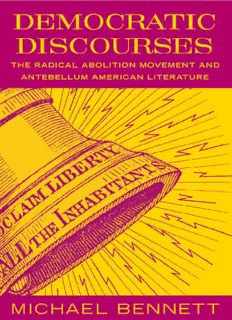
Democratic Discourses: The Radical Abolition Movement And Antebellum American Literature PDF
Preview Democratic Discourses: The Radical Abolition Movement And Antebellum American Literature
Democratic Discourses % Democratic Discourses The Radical Abolition Movement and Antebellum American Literature Michael Bennett Rutgers University Press New Brunswick,New Jersey,and London Library of Congress Cataloging-in-Publication Data Bennett,Michael,1962– Democratic discourses :the radical abolition movement and antebellum American liter- ature / Michael Bennett. p.cm. Includes bibliographical references and index. ISBN 0–8135–3572–7 (hardcover : alk. paper) — ISBN 0–8135–3573–5 (pbk. : alk. paper) 1.American literature—19th century—History and criticism. 2. Slavery in literature. 3.American literature—African American authors—History and criticism. 4. Politics and literature—United States—History—19th century. 5. Literature and society— United States—History—19th century.6.Radicalism—United States—History—19th century.7.African Americans—Intellectual life—19th century.8.Abolitionists—United States—Intellectual life.9.Antislavery movements in literature.10.African Americans in literature.11.Radicalism in literature.I.Title. PS217.S55B46 2005 810.9’3552—dc22 2004016423 British Cataloging-in-Publication data for this book is available from the British Library. Copyright © 2005 by Michael Bennett All rights reserved No part of this book may be reproduced or utilized in any form or by any means,elec- tronic or mechanical,or by any information storage and retrieval system,without writ- ten permission from the publisher.Please contact Rutgers University Press,100 Joyce Kilmer Avenue,Piscataway,NJ 08854-8099.The only exception to this prohibition is “fair use”as defined by U.S.copyright law. Manufactured in the United States of America This book is dedicated to my parents, Margery Harder Bennett and Edward Bennett. Contents Acknowledgments ix Introduction 1 1 Democratic Discourses: Visiting the National Anti-Slavery Bazaar 18 2 Bodily Democracy: Frances Ellen Watkins and Walt Whitman Sing the Body Electric 45 3 Gender Democracy: Margaret Fuller and Sojourner Truth Argue the Case of Woman versus Women 67 4 Economic Democracy: Frederick Douglass and Henry David Thoreau Negotiate the Mason-Dixon Line 90 5 Aesthetic Democracy: Harriet Beecher Stowe and Harriet Jacobs Represent the End(s) of Slavery 118 Conclusion 149 Notes 161 Works Cited 179 Index 199 vii Acknowledgments IWOULD LIKE to acknowledge all those who have made this book possible: my grandmother,Mildred Harder,without whom I quite literally would not be here; my parents, to whom this book is dedicated, Edward Bennett and Margery Harder Bennett,who helped me get here not only in a biological sense but also through their much-appreciated emotional and financial sup- port,not to mention how they generously made available their trained his- torical imaginations and proofreading abilities; mypartners,Phyllis Hunt,whose dedication and love made it possible for me to start this project,and Juan Battle,who combines the patience and per- sistence,toughness and caring,down-to-earthness and magic,that enabled me to finish it (“in other words,I love you”); my dissertation director,Deborah E.McDowell,who has had the single greatest impact on this project by reading and commenting in depth and detail on its various incarnations, whose precision of thought and style informs every page,and who is simply the smartest person I know;the staff and faculty of the University of Virginia, Ruth Estep, Peggy Gibson,Alan Howard, Bill Jackson, Adria LaViolette, Nancy Mazzei, the late Armstead Robinson,Mary Rose,Charles Rowell,Rosemary Sheuchenko,Joy Shiflette, Gail Shirley,and,particularly,Eric Lott,whose breadth of knowledge helped extend my perception; my colleagues from graduate school, Bluford Adams, David Bass, Matthew Crane,Susan Gennrich Crane,Kelly Cresap,Elisabeth Crocker,Alan DeGooyer, Michael Friel, Catherine Villanueva Gardner (thanks, Mom!), Charles Harmon,Jean Kane,Ann Ryan,Mason Stokes (who should be singled out for,among other things,sharing his knowledge about “whiteness studies” and providing a critique of the first chapter),David Teague,“Papa”Luis Vil- lanueva,Janna Wilson,Doris Witt,the Marxist phalanx,and numerous others; my students and colleagues at Long Island University’s Brooklyn Cam- pus,including the various participants in my graduate seminars—Nineteenth- century American Literature, Slavery and the Literary Imagination, and American Nature Writing—and undergraduate surveys on Literature in the ix
Description: